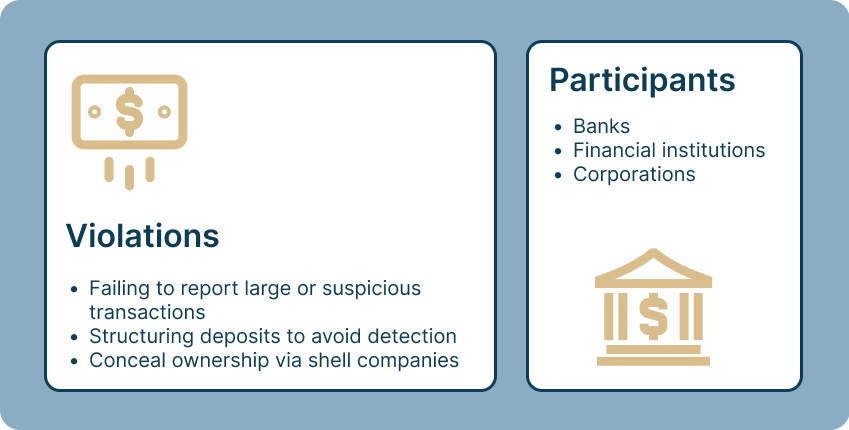What Is It?
Anti-Money Laundering (AML) refers to laws and regulations designed to prevent criminals from disguising illicit gains as legitimate income. These laws aim to detect and report suspicious financial transactions that could involve money laundering or terrorist financing.
Organizations Involved
Banks, financial institutions, and corporations may be involved in money laundering schemes. For example, a bank may fail to report suspicious transactions or assist criminals in moving illicit funds across borders.

Reportable Activities
Key violations include:
- Failing to report large or suspicious transactions
- Structuring deposits to avoid detection
- Using shell companies to conceal ownership
Reporting international fraud helps international whistleblowers protect the financial system and prevent illegal activities, and ensures integrity in global business and compliance with anti-corruption standards. To report Foreign Corruption or Money Laundering violations, it’s best to consult an experienced whistleblower law firm. They can guide you through the complexities of reporting and filing under whistleblower laws like the FCPA or AML regulations, ensuring confidentiality and protecting your rights as a whistleblower. Whistleblower lawyers can help you assess the case’s potential, prepare your claim, and ensure proper filing with agencies like the SEC, DOJ, or relevant authorities, increasing the chances of a successful outcome.
Read about Government programs and laws governing International fraud here

Please be advised that there are no obligations incurred until we have conducted a comprehensive review and reached a determination regarding the potential for proceeding with your matter.
Submit your case anonymously

 English
English  Español
Español  Русский
Русский  Turkish
Turkish  Persian (فارسی)
Persian (فارسی)  Arabic (العربية)
Arabic (العربية)  简体中文 (中国)
简体中文 (中国)